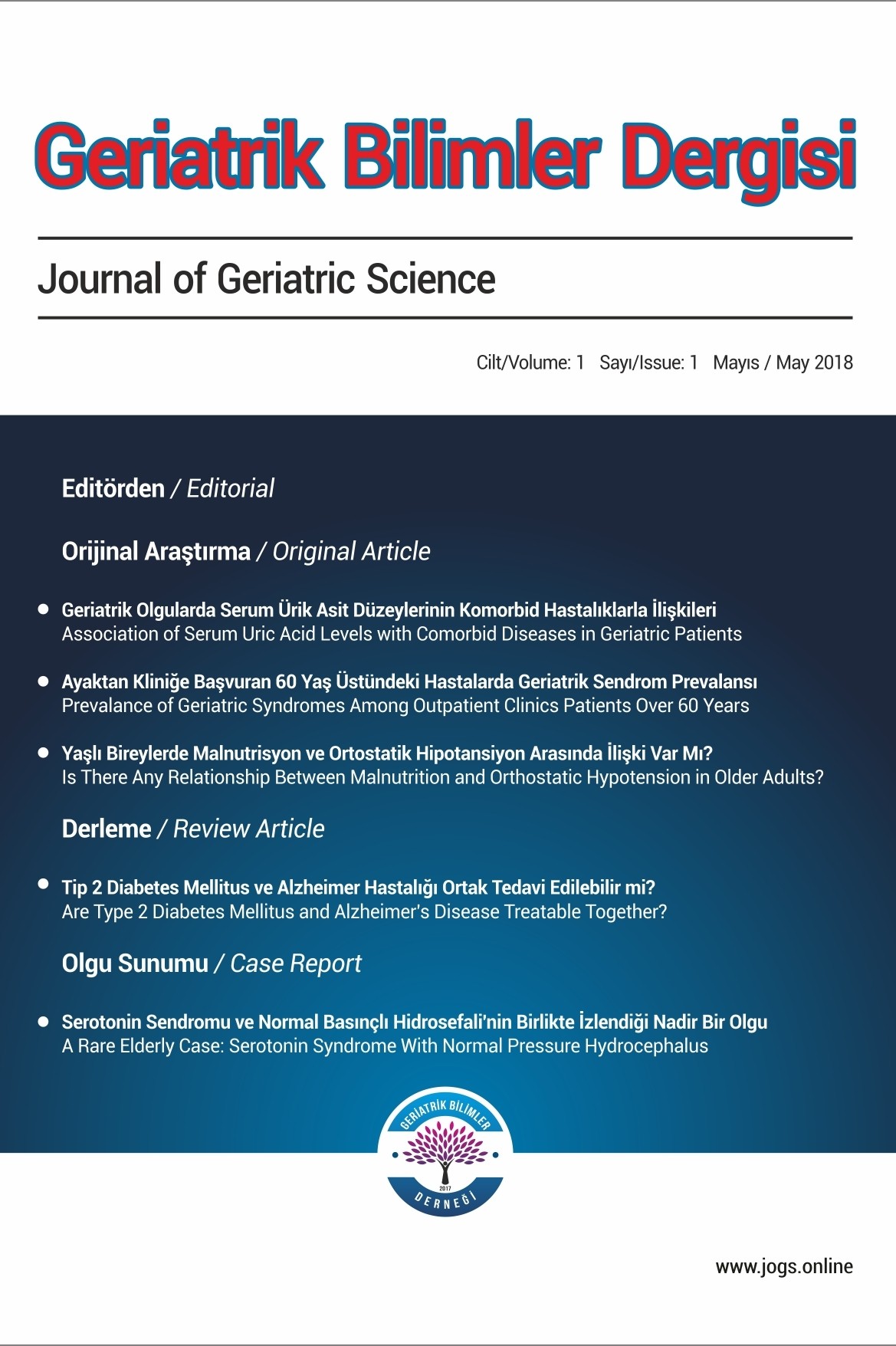Geriatrik Olgularda Ağrı Prevalansı ve Dağılımı
Amaç: Yaşlı erişkin nüfusu arttıkça, yaşa bağlı olarak kronik hastalıklar artmaktadır. Kronik ağrı yaşlı erişkinlerde sık görülen bir sağlık problemidir. Ağrı, aile üyeleri ve klinisyenler tarafından yaşlanma sürecinin bir parçası olarak görüldüğü için tedavi edilmemekte veya yetersiz tedavi edilmektedir. Çalışmamızın amacı, yaşlı erişkinlerde ağrı prevelansını ve vücut bölgelerine göre ağrı oranlarını değerlendirmektir. Gereç ve Yöntemler: Çalışmamız kesitsel olup, Geriatri Kliniğine başvuran 1078 hasta ile yapılmıştır. Hastalar; ağrı, ağrının yeri, cinsiyet, vücut kitle indeksi, eğitim durumu, medeni hal, yaşama ortamı ve kullandıkları ilaç sayısına göre sınıflandırıldı. Elde edilen verilerden ağrı prevelansı ve ağrının dağılımı hesaplandı. Bulgular: Çalışmaya dahil edilen hastaların yaş ortalaması 73,65±8,05 yıldı. Hastaların %70’inde (n=750) ağrı vardı. Erkek katılımcılarda ağrı sıklığı %45,6 (n=131) iken kadınlarda %78 (n=619) olarak hesaplandı (p<0.001). Tüm hastalar incelediğinde, en sık ağrıyan bölgeler; diz (%25,8), yaygın (%24,1) ve bel ağrısı (%16,1) olarak tespit edildi. En sık ağrı kadınlarda yaygın ağrı (%26,6) iken erkeklerde diz ağrısı (%30,4) olarak tespit edildi. Sonuç: Geriatrik hastalarda ağrı oldukça sık görülmektedir. Çalışmamızda kadınlarda, erkeklere göre ağrı daha fazla görüldü. En sık ağrı hissedilen üç bölge; kadınlarda yaygın, diz ve bel ağrısı; erkeklerde diz, bel ve karın ağrısıdır. Hayat kalitesinde azalma, kognitif fonksiyonlarda bozulma, yürüme ve denge problemleri, düşme, uyku bozukluğu ve ölüme neden olabileceğinden ağrının değerlendirilmesi ve yeterli tedavi edilmesi önem taşımaktadır.
Anahtar Kelimeler:
Ağrı, lokalizasyon, prevelans, sosyodemografik
Prevalance and Distribution of Pain in Geriatric Patients
Aim: As older adult population increases, chronic diseases are increasing depending on age dramatically. Chronic pain is a common health problem in older adults. Furthermore, pain is not treated or under-treated because it is seen as part of the aging process by family members and clinicians. The aim of our study was to evaluate the prevalence of pain in older adults and pain rates according to body regions. Material and Methods: This cross-sectional study was carried out with 1078 patients who admitted to Geriatric Clinic. Patients were classified as pain, pain location, gender, body mass index, educational status, marital status, who they live with and the number of drugs they used . Pain prevalence and pain distribution were calculated from the data obtained. Results: The mean age of the patients in the study was 73.65±8.05 years. 70% (n = 750) of the patients had pain experience. The prevalence of pain in male participants was 45.6% (n = 131) and 78% in women (n = 619) (p <0.001). When all patients were analyzed, the most common pain sites are; knee (25.8%), widespread (24.1%) and low back pain (16.1%). The most common pain was widespread pain in women (26.6%) and knee pain in men (30.4%). Conclusion: Pain is frequently seen in geriatric patients. In our study, pain was more common in females than males. The three most common pain sites were; widespread, knee and low back pain in women; knee, low back pain and abdominal pain in men. It is important to evaluate the pain and to treat it adequately as it can cause a decrease in quality of life, impairment of cognitive functions, gait and balance problems, falling, sleep disorder and death.
Keywords:
Localization, Pain, Prevalence, Sociodemographic,
___
- 1. Persons AGSPoPPiO. The management of persistent pain in older persons. Journal of the American Geriatrics Society. 2002;50(6 Suppl):S205-24.
- 2. Cavalieri TA. Pain management in the elderly. The Journal of the American Osteopathic Association. 2002;102(9):481-5.
- 3. Garland EL. Pain processing in the human nervous system: a selective review of nociceptive and biobehavioral pathways. Primary care. 2012;39(3):561-71.
- 4. Tousignant-Laflamme Y, Marchand S. Sex differences in cardiac and autonomic response to clinical and experimental pain in LBP patients. European journal of pain (London, England). 2006;10(7):603-14.
- 5. Keefe FJ, Wilkins RH, Cook WA. Direct observation of pain behavior in low back pain patients during physical examination. Pain. 1984;20(1):59-68.
- 6. Reid MC, Eccleston C, Pillemer K. Management of chronic pain in older adults. BMJ (Clinical research ed). 2015;350:h532.
- 7. Herr KA, Garand L. Assessment and measurement of pain in older adults. Clinics in geriatric medicine. 2001;17(3):457-78, vi.
- 8. Thomas A. Cavalieri D. Managing Pain in Geriatric Patients. The Journal of the American Osteopathic Association. June 2007;107:ES10-ES6.
- 9. Lawton MP, Brody EM. Assessment of older people: self-maintaining and instrumental activities of daily living. The Gerontologist. 1969;9(3):179-86.
- 10. Schofield P. The Assessment of Pain in Older People: UK National Guidelines. Age and ageing. 2018;47(suppl_1):i1-i22.
- 11. Hadjistavropoulos T, Herr K, Turk DC et al. An interdisciplinary expert consensus statement on assessment of pain in older persons. The Clinical journal of pain. 2007;23(1 Suppl):S1-43.
- 12. Nuttall FQ. Body Mass Index: Obesity, BMI, and Health: A Critical Review. Nutrition today. 2015;50(3):117-28.
- 13. Patel KV, Guralnik JM, Dansie EJ et al. Prevalence and impact of pain among older adults in the United States: findings from the 2011 National Health and Aging Trends Study. Pain. 2013;154(12):2649-57.
- 14. Pan F, Tian J, Aitken D et al. Predictors of pain severity trajectory in older adults: a 10.7-year follow-up study. Osteoarthritis and cartilage. 2018.
- 15. Rundell SD, Sherman KJ, Heagerty PJ et al. Predictors of Persistent Disability and Back Pain in Older Adults with a New Episode of Care for Back Pain. Pain medicine (Malden, Mass). 2017;18(6):1049-62.
- 16. John AR, Canaday DH. Herpes Zoster in the Older Adult. Infectious disease clinics of North America. 2017;31(4):811-26.
- Yayın Aralığı: Yılda 3 Sayı
- Başlangıç: 2018
- Yayıncı: Geriatrik Bilimler Derneği
Sayıdaki Diğer Makaleler
Banu BÜYÜKAYDIN, Elmas BİBERCİ KESKİN
Yaşlı Diyaliz Hastalarında Geriatrik Sorunlar
Geriatrik Bireylerde Ai Chi Egzersizlerinin Denge Üzerine Etkileri
Barış GÜRPINAR, İlkşan DEMİRBÜKEN, Kamile İnan KELEŞ, Nursen İLÇİN
Artroplasti Ameliyatı olan Yaşlı Hastaların Ağrı Düzeyi ve Etkileyen Faktörler
Hale TURHAN DAMAR, Özlem BİLİK
Yaşlı Farelerde Florür Maruziyetinin Motor Performans, Depresyon ve Hafıza Üzerine Etkileri
Beril KADIOĞLU YAMAN, Kübra YALMAN, Melda ÖZGÜRBÜZ, Övgü KAZANÇ, İlke KUŞATMAN, Turgay ÇELİK
